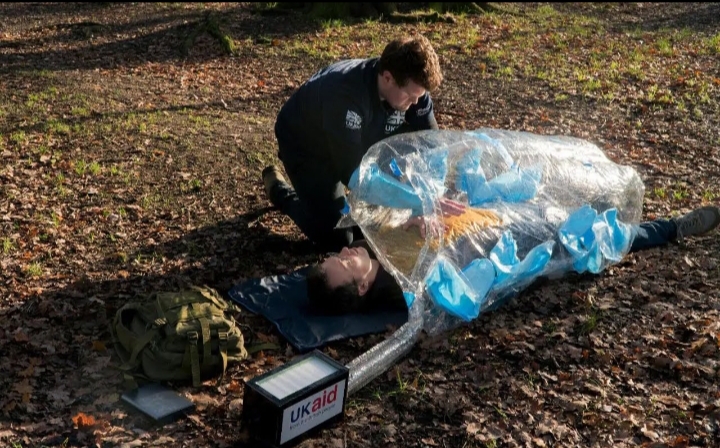A UK-funded inflatable operating theatre that fits into a backpack is set to revolutionise surgery in emergencies when doctors are forced to operate on the hoof.
Despite its Heath Robinson-like appearance, the SurgiBox will be a boon for doctors working in conflict zones and humanitarian crises, such as earthquakes and other natural disasters, when they have to operate quickly, in the open air and with minimal equipment.
One of the biggest problems for medics in the field is finding a sterile environment in which to operate. But the SurgiBox, part funded by the Department for International Development, completely covers a patient and provides a sealed, hygienic area for doctors to work in.
“It’s incredibly exciting because SurgiBox creates the opportunity to make safe surgery accessible,” the inventor, Dr Debbie Lin Teodorescu, told The Telegraph. “It’s not just a good operating room, but a better than state-of-the-art operating room.”
The idea is to shrink a whole operating theatre into one backpack. The tent-like enclosure is made of single-use, clear plastic to ensure no cross contamination between operations.
In numbers | Surgical infections
● 5 billion people do not have access to safe, affordable surgical and anaesthsia care when needed.
● 143 million additional surgical procedures are needed in low and middle income countries each year to save lives and prevent disability.
● Only 6 per cent of procedures each year take place in the poorest countries, where over a third of world’s population lives.
● A quarter of people who have a surgical procedure will incur a financial catastrophe as a result of seeking care.
● In 2010, an estimated 16.9 million lives were lost from conditions needing surgical care, 33 per cent of all deaths worldwide.
Source: The Lancet Commission
A rechargeable battery inflates the SurgiBox in less than two minutes and powers the airflow system to keep it sterile. Once the tent is inflated doctors can work on the patient through armholes.
The whole kit weighs less than five kilograms and fits into a 30 litre backpack. Although it can be used for any operation, including caesareans, it has been designed mainly for chest, abdominal, orthopedic and pelvic procedures which are most common in the field.
The designers of SurgiBox, which costs as little as £100 to manufacture, say it is a significant improvement on the current drapes used in the field, but at a similar price. It also protects health workers from blood splatters and other bodily fluids.
“Surgery can happen anywhere in the field,” said Dr Teodorescu. “If [doctors] have a surgical tent they operate there, if they have a bombed out school they might use that. People have to be incredibly resourceful in these situations.
“But our system doesn’t rely on having anything . You don’t even need an operating table. It means surgery can happen anywhere,” she added.
SurgiBox has been seven years in the making and the current model is the sixth design. Dr Teodorescu came up with the idea while at medical school, after her supervisor told her about the challenges of performing surgery following the Haiti earthquake.

“As an idealistic student, I thought this seemed insane,” said Dr Teodorescu, “So I started working with the idea of a transportable surgical box, like a glove box. The idea has changed since then, but that’s where the name came from.”
But although the design is yet to be piloted in the field, the SurgiBox team hopes to receive regulatory approval for trials by the end of next year. The process will be aided by a US $250,000 (£200,000) grant from the Humanitarian Grand Challenge fund, a joint venture between the UK, US and Netherlands governments.
SurgiBox is one of 23 innovations supported by the fund, which will invest a total of £25 million in projects over the next two years.
“UK aid is at the cutting edge of research and innovation that will change the way that emergency surgery is delivered in conflict and disaster zones, allowing safe, effective surgery any place, any time,” said Penny Mordaunt, international development secretary.
“This is one of several projects from the Humanitarian Grand Challenge, which I initiated with my counterparts at USAID to support and nurture ideas which will allow us to deliver aid more effectively in the future.”

